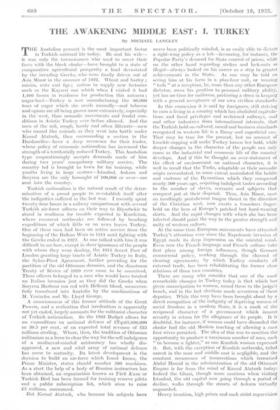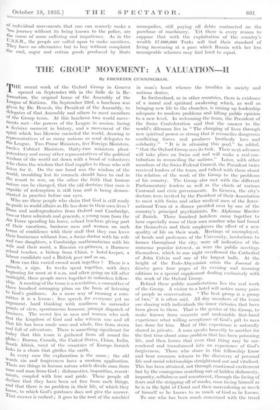THE AWAKENING MIDDLE EAST : I. TURKEY
By. MICHAEL LANGLEY
THE Anatolian peasant is the most important factor in Turkish national' life today. He and his Wife. it was only the townswomen who used to cover their faces with the black chadar—have brought to a state of comparative agricultural prosperity a land devastated by the invading Greeks, who were finally driven out of Asia Minor in the summer of 1922. Wheat and barley ; raisins, nuts and figs ; cotton to supply new factories such as the Kayseri one which when I visited it had 1,400 looms in readiness for production this autumn ; sugar-beet—Turkey is now manufacturing the 80,000 tons of sugar which she needs annually—and tobacco and opium are all being grown more extensively, especially in the' west; than nomadic movements and feudal con- ditions in Asiatic Turkey ever before allowed. And the men of the soil, rough, hardy ..and often illiterate—men who roared like animals as they went into battle under Kamal ''Ataturk, then commanding a section in the Dardanelles—have a deep reverence for their leader, whose policy of economic nationalism has increased the strength of a territorially reduced Turkey. This Anatolian type unquestioningly accepts demands made of him during two years' compulsory military service. The country lad is brought to town for his training, while youths living in large centres—Istanbul, Ankara and Smyrna are the only boroughs of 100,000 or over—are sent into the country.
Turkish nationalism is the natural result of the deter- mination of a proud people to re-establish itself after the indignities suffered in the last war. I recently spent twenty-four hours in a railway compartment with several Turkish air-force officers on their way to Diyarbekir to stand in readiness for trouble expected in Kurdistan, where recurrent outbreaks are followed by bombing expeditions of which little or no news leaves Turkey. One of these men had been on active service from the beginning of the Balkan Wars in 1911 until fighting with the Greeks ended in 1922. As one talked with him it was difficult to see how, except in sheer ignorance of the people with whom they were dealing, the 1915 Secret Pact of London granting large tracts of Asiatic Turkey to Italy, the Sykes-Picot Agreement, further providing for the partition of the old Ottoman domains, and the disastrous Treaty of Sevres of 1920 ever came to be conceived. These officers belonged to a race who would have treated an Italian invasion just as they did the Greeks when Smyrna Harbour ran red with Hellenic blood, unsuccess- fully • transfused into Anatolia by the machinations of • M. Venizdos and Mr. Lloyd George„ A consciousness of this former attitude of the Great Powers, and a realisation that irredentism is apparently not yet ended, largely accounts for the militarist character of Turkish nationalism. So the 1935 Budget allows for an expenditure on national defence of XTqs05,000,000 or 30.5 per cent. of an expected total revenue of £35 millions sterling. Where, then, the tradition of Ottoman militarism as a force to clear the way for the self-indulgence of a mediaeval-minded aristocracy has wholly dis- appeared, a new and vital army of national defence has come to maturity. Its latest development is the decision to build an air-force which Ismet Inonu, the Prime Minister, states. should number .500 machines. As a start the help of a body of Russian instructors has been obtained, an organisation known as • Turk Kusu or Turkish Bird has been formed for training reserve pilots and a public subscription list, which aims to raise £5 millions, announced.
. But Kamal Ataturk, who because. his subjects have never been politically minded, is as easily able to dictate a right-wing policy as a left—favouring, for Instance, the Popular Party's demand for State control of prices, while on the other hand regarding strikes and lock-outs as illegal—alWays looked on his -career as a step to greater achievements in the State. As one may be told on seeing him at his farm in a plus-four suit, or wearing " tails " at a reception, he, more than any other European dictator, owes his position to personal military, yet has no time for uniforms, preferring a dress in keeping with a general acceptance of our own civilian standards.
In this connexion it is said by foreigners, still striving to earn a living in a country which has abolished capitula- tions and fiscal privileges and reclaimed. railways, coal and other industries from international interests, that the Turkish hold on cultural, moral and business standards recognised in western life is a flimsy and superficial one. That may be true for the present, but no amount of knuckle-rapping will make Turkey loosen her hold, while deeper changes in the character of the people can only come as the industrial and economic life of the country develops. And if this be thought an over-statement of the effect of environm.mt on national character, it is well to recall that the Turks, adaptable as their nomadic origin necessitated, to some extent assimilated. the habits and customs of the Byzantium which they, compered, nearly 500 years ago, acquiring indulgent tastes according to the number of slaves, servants and subjects that conquest put at their disposal. Thus, Asia Minor, once an insultingly, protuberant tongue thrust in the direction of the Christian west, now exerts a tenacious finger-. hold on the hem of Europe's patched but hard-wearing. skirts. And the rapid changes with which .she has been infected should point the way to the greater. .strength and unity of western culture.
At the same time European movements have attracted Turkey's attention ever since the Napoleonic invasion of Egypt made its deep impression on the oriental mind. Even now the French language and French, culture take first place among foreign influences, though German commercial policy, working. through the channel of clearing agreements, by which Turkey .condutts all external trade, has been rehabilitating the former close relations of those two countries.
There are many who consider that one of the most remarkable changes in Turkey today is that which has given emancipation to women, raised them to the judge's bench, and in the last elections made seventeen of them deputies. While this may have been brought about by a direct recognition of the indignity of depriving women of social freedom in a modern State, it is a mark of the reciprocal character of a government which insures security in return for the allegiance of its, people. It i9 doubtful, for instance, if women could have discarded the chadar had the old Moslem teaching of allowing a man four wives persisted. The idea of this was to sanction the opportunity to produce a maximum number of sons, each " to 'become a fighter," as one Kurdish woman expressed it. But, with the exception of Kurdish outbreaks, tribal unrest in the near and middle east is negligible, and the constant occurrence of insurrections which terrorised Abdul Hamid in the administration of the ,old Ottoman Empire is far from the mind of Kamal Ataturk today. Indeed the Ghazi, though more cautious. when visiting Istanbul, the old capital now going through a period of decline, walks through the streets of Ankara virtually unguarded. • Heavy taxation, high prices and such strict .supervision o_ f individual movements that one can scarcely make a 'bus journey without its being known to the police, are the cause of some suffering and impatience. As in the U.S.S.R., the people are called upon to make sacrifices. They have no alternative but to buy without complaint the coal, sugar and cotton goods produced by State monopolies, still paying off debts contracted on the purchase of machinery. Yet there is every reason to suppose that with the exploitation of the country's wealth 17,000,000 Turks will find their standard of living increasing at a pace which Russia with her less manageable schemes may find hard to equal.



























































 Previous page
Previous page